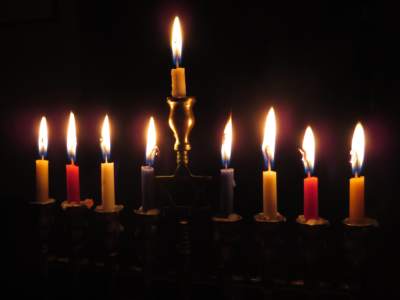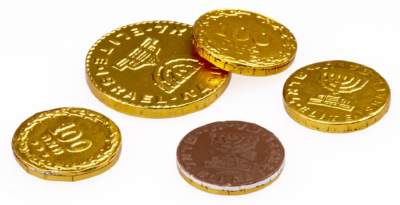In Houston, Texas, Laverne Cox looked out on an auditorium of eager listeners at the 2014 National Conference on LGBTQ Equality. In her keynote speech, she made a statement that stood out to me.
Cox was talking specifically about trans women of color working together instead of fighting for resources and how that in and of itself is a revolutionary act. Citing her friendships with trans activists Janet Mock and Carmen Carrera, she expressed that we must begin to question the notion that there are not enough resources to go around.
I have been meditating on those words lately in the context of Hanukkah. In the story of Hanukkah, the Maccabees believe there is only enough oil to last for one night, yet the oil lasts for eight nights. They probably felt they had little hope left. However, the miracle reminded them that they had more than they realized. It reminded them of their capacity for survival beyond what they knew to be possible and of a greater resource they could draw from – faith.
During Hanukkah, we put our chanukiah by the window in order to publicize the miracle and share the light with others. In doing so, we share an important message: light does not decrease when we share it.
Within social justice movement spaces, we sometimes feel we must compete for resources, social capital, and emotional endurance. This creates an isolationist mentality and keeps marginalized groups from working together and learning from others, especially in the current political climate, which is exacerbating divisions.
For example, the Trump administration singled out transgender Americans by attempting to ban them from the military. Efforts like these separate trans people from the rest of the LGBTQ community and divide us. Already trans people feel like they have to fight for their place in LGBTQ organizations primarily focused on cisgender gay men and women. By separating out trans folks from the rest of us, Trump stoked already existing anxieties about too few resources among members of the same community.
The president also demonizes Muslims and attempts to pit the rest of America against them. Islamophobes, meanwhile, paint all Muslims as homophobic, transphobic, and anti-feminist to put them at odds with the LGBTQ community and progressive circles. More generally, Trump singles out immigrants, suggesting that they use up precious American resources and take our jobs. We are living in a time of rising isolationist sentiment, with Britain leaving the European Union and the United States enacting increasingly harsh restrictions on immigration like Trump’s infamous Muslim Ban.
Cox noted this infighting problem when she referred to the scarcity model as a myth. She meant that, despite rhetoric to the contrary, there are enough resources for all of us, and we need not compete against one other.
Similarly, we know that there is enough food to go around globally, and that hunger and famine are not inevitable or necessary. Hunger occurs because food and resources are distributed in an inequitable manner, and capitalism is fundamentally based in a philosophy of competition. Scarcity occurs because of the institutional neglect that allows food deserts to exist.
However, this scarcity outlook is not limited to tangible resources. Hanukkah is an important reminder that we all have enough compassion and empathy to go around. We all are capable of more than we believe. We need not view others with suspicion and distrust. Sharing a little warmth can provide someone else with the spiritual nourishment they need when they are running on empty. Cox suggested that love is an inexhaustible resource. We all rise when we lift each other up, and we all benefit when we share our talents and knowledge collectively.
When we are pitted against other oppressed groups, it distracts us from this fact. We forget that when we work together, there is enough material and spiritual sustenance for all of our communities. It is true that the flow of resources can be slowed to a trickle depending on who controls the faucet. But when we stand together and are mindful of each other’s needs, we can break the dam. When we shed light and share it, everyone can see clearer.
We need not face others defensively. Instead, we should greet each other with open arms. Hanukkah reminds us to approach others from a mentality of abundance.
Emily Strauss is a senior at Pennsylvania State University. She is a frequent New Voices contributor and an occasional contributor to The Forward and Jewish Currents. She can be reached at els5343@gmail.com.
![chocolate-coins-566201_1920 | [Public Domain], via Pixabay](https://newvoices.org/wp-content/uploads/2017/12/chocolate-coins-566201_1920.jpg)


